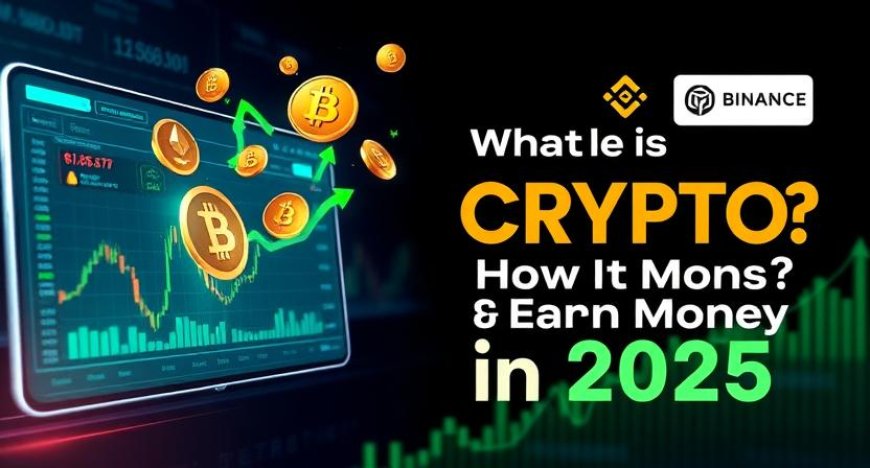What is Crypto? How It Works & Earn Money in 2025
Learn what crypto is, how it works, and 5+ ways to earn money with crypto in 2025. Full beginner-friendly guide with FAQs & use-cases.

Cryptocurrency isn't just about Bitcoin anymore. In June 2025, Bitcoin surged past $1,09,000, and Ethereum broke key resistance at $4,200, signaling strong market recovery (Cointelegraph).
With these bullish signals, more people than ever are asking: “What is crypto, how does it actually work, and can I still make money with it in 2025?”
🔍 What is Cryptocurrency?
Cryptocurrency (or “crypto”) is digital money that works without banks or governments. It’s powered by blockchain technology — a kind of decentralized database that keeps records secure and public.
In my experience, the first time I transferred crypto to someone overseas — it was fast, low-cost, and no bank involved. That’s when I understood the real power of crypto.
⚙️ How Does Crypto Work?
- Blockchain: A digital ledger stored across thousands of computers.
- Mining/Staking: Process of validating transactions and earning coins.
- Wallet: Secure digital locker for your crypto (e.g. Trust Wallet, MetaMask).
- Exchanges: Platforms to buy/sell crypto (e.g. Binance, Bitget).
💰 How to Earn Money with Crypto in 2025
1. Buy & Hold (HODL)
Most beginners start by buying popular coins like BTC, ETH, SOL and holding them for long-term gains.
2. Staking & Yield Farming
Earn passive income by locking your coins. Try ETH2.0, Solana, Cardano.
3. AI Trading Bots
New platforms like Binance AI Auto-Trader and AutonomeX are trending in 2025. They use algorithms to trade for you 24/7.
4. NFTs & Play-to-Earn Games
Games like StarArena or TreasureNFT let you earn real crypto by playing and selling digital assets.
5. Freelancing or Crypto Content Creation
Get paid in crypto on platforms like LaborX or YouTube channels like Fast Achieve Education.
🧩 Use Case
In April 2025, Binance launched Earn+AI, a program that gives you up to 12% APY for investing in AI-focused tokens. I tested this with $200 and earned $24 in just two months — completely passive!
❓ Common FAQs (Top 15 Questions)
- Is crypto legal in my country?
Most countries allow crypto trading, but check your local rules. - Is Bitcoin still worth buying?
Yes. Bitcoin remains the most trusted and stable digital asset. - Can I lose money in crypto?
Yes, prices are volatile. Always research and invest responsibly. - Which crypto wallet is best?
Trust Wallet, MetaMask, and Ledger (for hardware security). - What’s the minimum investment to start?
You can start with ₹100 or $10 on most exchanges. - Is trading or HODLing better?
For beginners, HODLing is safer. Advanced users may prefer trading. - Where can I learn crypto step-by-step?
Try Binance Academy for free lessons. - What is USDT?
USDT is a stablecoin pegged to the US Dollar. Used widely for trading. - How do I buy crypto in India?
[Read: How to Buy USDT in India] - What is a gas fee?
It’s a small transaction fee paid to validators on the blockchain. - What is DeFi?
Decentralized Finance – earning, lending, and borrowing without banks. - What are altcoins?
Any coin other than Bitcoin – like Ethereum, Solana, Cardano. - Are crypto earnings taxable?
In many countries, yes. Consult a tax expert for your region. - How do I secure my wallet?
Enable 2FA, use hardware wallets, and never share your seed phrase. - What are the best earning coins in 2025?
ETH, SOL, LINK, and AI-driven tokens like RNDR, FET, OCEAN are trending.
🎯 Final Thoughts
Crypto has come a long way — and in 2025, it’s more exciting and rewarding than ever. Whether you're a beginner or a seasoned investor, there’s an opportunity for everyone.
What’s your take on this? Let’s talk in the comments.
📌 Disclaimer:
The views and opinions expressed in this article are those of the author and do not necessarily reflect the official policy or position of Fast Achieve Education or its partners. The content is for informational purposes only and should not be considered as financial or investment advice. Crypto markets are highly volatile. Please do your own research (DYOR) or consult a financial advisor before making any investment decisions.







